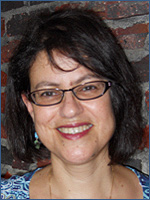Leila Hamroun-Yazid

Leila Hamroun-Yazid, AIA, NCARB, LEED AP, is the founder of Past Forward Architecture, an architectural practice based in Newark, DE providing design, planning, management and cultural analysis services primarily for existing buildings, with a mission to promote a preservation strategy of economic, cultural and social relevance.
Leila Hamroun-Yazid, AIA, NCARB, LEED AP, is the founder of Past Forward Architecture, an architectural practice based in Newark, DE providing design, planning, management and cultural analysis services primarily for existing buildings, with a mission to promote a preservation strategy of economic, cultural and social relevance.
Leila is an accomplished design professional with twenty-five years of national and international heritage preservation experience, and a distinguished track record in customized, sustainable design strategies and award-winning projects.
In addition to a Masters Degree in Urban Planning and Public Policy from the University of Delaware, Ms. Hamroun holds an architecture degree from the Polytechnical School of Architecture and Urbanisme in Algiers, Algeria, and a diploma in historic preservation from the Center for the Historic Studies and Conservation of Ancient Monuments (Ecole de Chaillot) in Paris, France. Her multilingual, multicultural background gives her a uniquely nuanced perspective on the preservation and management of the built patrimony and cultural heritage.
Ms. Hamroun is consistently expanding her field expertise and technical excellence with the sustained pursuit of research projects and academic knowledge. She regularly enriches her practice with guest speakerships, presentations to national and international professional and civic organizations, and publications, most recently co-authoring the chapter on “Principles of Architectural Preservation” in A Companion to Cultural Resources Management, King, ed. (Blackwell 2010). She strongly believes in civic engagement and community-based involvement, and is active in the leadership of various non-profit organizations. These efforts include preservation groups as well as professional organizations, educational institutions, and starting an oncology patients advocacy group to address disparities in clinical trial enrollment and access.